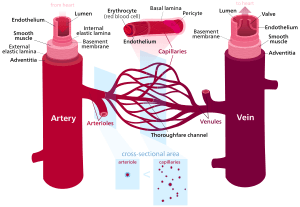Vasodilation facts for kids
Vasodilation is when your blood vessels get wider. This happens because tiny muscle cells in the walls of your blood vessels relax. When these muscles relax, the vessels open up more, allowing more blood to flow through.
Vasodilation is the opposite of vasoconstriction, which is when blood vessels become narrower.
When your blood vessels widen, more blood can flow easily. This also helps to lower your blood pressure. Medicines that make blood vessels wider are called vasodilators. Doctors might use these medicines to treat certain health conditions.
Contents
What is Vasodilation?
Vasodilation is a natural process in your body. It means your blood vessels, like arteries and veins, expand. Think of it like a hose pipe that gets wider. When the hose is wider, more water can flow through it at once. In your body, this means more blood can reach different parts.
How Does it Work?
Inside the walls of your blood vessels, there are tiny smooth muscles. These muscles can either tighten or relax. When they relax, the blood vessel walls become less tense, and the vessel widens. This relaxation is controlled by signals from your brain and by chemicals in your body.
Why Does Our Body Do This?
Your body uses vasodilation for many important reasons. It helps to control your body temperature and make sure your organs get enough blood.
Vasodilation and Body Temperature
When you get too hot, your body uses vasodilation to cool down. Blood vessels near your skin widen. This allows more warm blood to flow closer to the surface of your skin. The heat then escapes into the air, helping you cool off. This is why your face might look red after you've been running or when it's hot outside.
Vasodilation and Exercise
When you exercise, your muscles need more oxygen and nutrients. To meet this demand, blood vessels leading to your working muscles widen. This increases blood flow, delivering more of what your muscles need to keep going. It also helps to remove waste products from the muscles.
Vasodilation and Blood Pressure
When blood vessels widen, there is less resistance to blood flow. This means your heart doesn't have to work as hard to push blood through your body. As a result, your blood pressure can go down. This is why some medicines for high blood pressure are vasodilators.
Vasodilators: Helpful Medicines
Vasodilators are a type of medicine that causes blood vessels to widen. Doctors might prescribe these medicines for people with conditions like:
- High blood pressure: By widening blood vessels, these medicines help lower blood pressure, reducing the strain on the heart.
- Heart failure: They can make it easier for the heart to pump blood, improving its function.
- Angina: This is chest pain caused by reduced blood flow to the heart. Vasodilators can increase blood flow to the heart muscle, easing the pain.
These medicines work in different ways to relax the muscle cells in blood vessel walls.
Vasoconstriction: The Opposite
The opposite of vasodilation is vasoconstriction. This is when blood vessels become narrower. Vasoconstriction happens when the muscle cells in the vessel walls tighten. Your body uses vasoconstriction to:
- Keep warm: When you are cold, blood vessels near your skin narrow to keep warm blood deeper inside your body.
- Control bleeding: If you get a cut, blood vessels will narrow to reduce blood loss.
- Increase blood pressure: If your blood pressure drops too low, your body can constrict vessels to raise it.
Both vasodilation and vasoconstriction are important processes that help your body stay healthy and balanced.
See also
In Spanish: Vasodilatación para niños
 | Isaac Myers |
 | D. Hamilton Jackson |
 | A. Philip Randolph |


